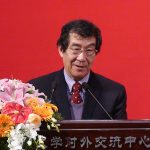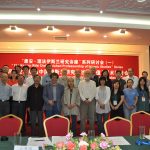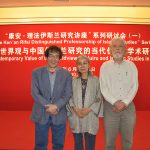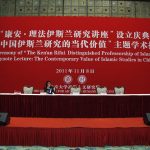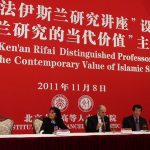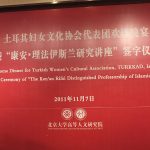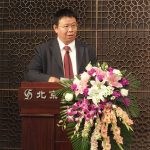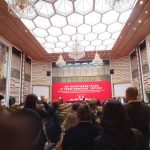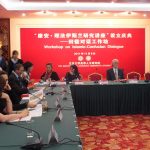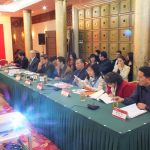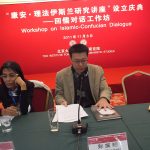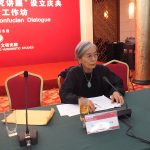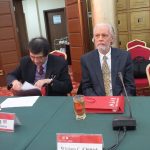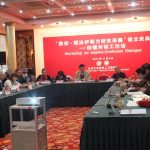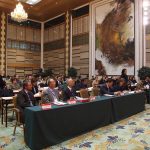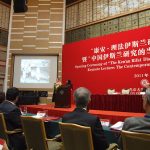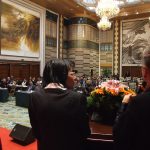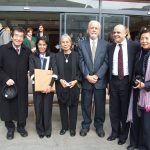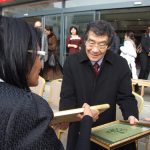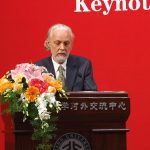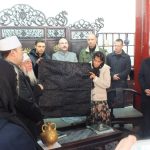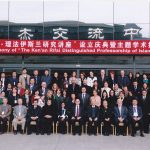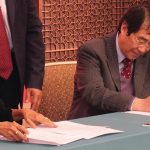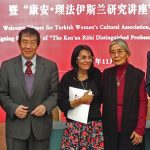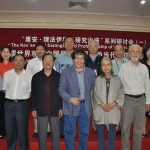China, Peking University
Institute of Humanities
Ken'an Rifâî Chair of Islamic Studies
Institute for Advanced Humanistic Studies, Peking University, The Ken'an Rifai Distinguished Professorship of Islamic Studies
Institute of Humanities
Ken'an Rifâî Chair of Islamic Studies
Institute for Advanced Humanistic Studies, Peking University, The Ken'an Rifai Distinguished Professorship of Islamic Studies
The Chair was established by TÜRKKAD Istanbul on August 19, 2010.
It was inaugurated in October 2011 and started education.
It was inaugurated in October 2011 and started education.
Founded in 1898, Peking University, formerly Imperial University of Beijing, was the first comprehensive public university established in China.
According to 2012 data (QC), the university is among the top 100 universities in the world rankings and ranks 30th in social sciences. in the ranking.
Prof. William Chittick and Prof. Sachiko Murata were appointed to the Kenan Rifai Chair of Islamic Studies.
Prof. William Chittick and Prof. Sachiko Murata were appointed to the Kenan Rifai Chair of Islamic Studies.
With the chair opened in the Institute of Humanities, undergraduate and graduate courses on Islamic studies are given and academic research is carried out.
"...I would like to once again express my admiration and appreciation for the work that your organization, TÜRKKAD Istanbul, is doing in Turkey, America and now in China. With the establishment of this chair, the Beijing Institute of Humanities and its students will expand and deepen their field of study by conducting 'Islamic studies'. On behalf of Ben Weiming Tu Peking University, I would like to express our gratitude for this invaluable contribution."
Weiming Tu, Prof., Peking University, Head of the Institute of Humanities
Founded in 1898, Peking University, formerly Imperial University of Beijing, was the first comprehensive public university established in China. It was also the highest administrative body of that period. In May 1912, the school received its current name. In 1952, the University became a university of science and human values, with a greater emphasis on research, in order to keep abreast of innovations. In April 2000, a brand new Peking University was formed when it absorbed the former Beijing Medical University. Today, Peking University offers services in a wide range of fields such as Natural Sciences, Applied Sciences, Engineering Sciences, as well as Humanities and Social Sciences, Administrative Sciences, Linguistics.
Currently, over 33800 students attend Peking University, including 15128 graduate students. The university has 5 faculties and 31 colleges. There are 98 research institutes, 126 research centers, 11 laboratories and 12 teaching hospitals. In addition, it offers 101 specializations for its students, 4 specializations for double-diploma students, 224 specializations for master's candidates, and 202 specializations for doctoral candidates. In addition to all this, there are opportunities for training in 81 disciplines of great importance to the nation and 35 post-doctoral research stations. The teaching staff of the University consists of 52 members of the Chinese Academy of Science, 8 members of the Chinese Academy of Engineering, 5 members of the III. It consists of 3276 faculty members, including members of the World Academy of Sciences.
Peking University maintains an exchange program with 240 schools from 49 countries and regions as part of its worldwide cooperation. According to 2012 data (QC), the university is among the top 100 universities in the world rankings and ranks 30th in social sciences. in the ranking. (Peking University's web address: http://english.pku.edu.cn/)
Currently, over 33800 students attend Peking University, including 15128 graduate students. The university has 5 faculties and 31 colleges. There are 98 research institutes, 126 research centers, 11 laboratories and 12 teaching hospitals. In addition, it offers 101 specializations for its students, 4 specializations for double-diploma students, 224 specializations for master's candidates, and 202 specializations for doctoral candidates. In addition to all this, there are opportunities for training in 81 disciplines of great importance to the nation and 35 post-doctoral research stations. The teaching staff of the University consists of 52 members of the Chinese Academy of Science, 8 members of the Chinese Academy of Engineering, 5 members of the III. It consists of 3276 faculty members, including members of the World Academy of Sciences.
Peking University maintains an exchange program with 240 schools from 49 countries and regions as part of its worldwide cooperation. According to 2012 data (QC), the university is among the top 100 universities in the world rankings and ranks 30th in social sciences. in the ranking. (Peking University's web address: http://english.pku.edu.cn/)
Prof. William Chittick and Sachiko Murata served as lecturers at the Kenan Rifai Chair of Islamic Studies for two years.
William Chittick:
He is Professor of Comparative Studies at the State University of New York. Born and raised in Milford, Connecticut, William C. Chittick received his BA in history from the College of Wooster in Ohio and his PhD in Persian literature from the University of Tehran in 1974.
He taught Comparative Religions at the Humanities Department of Aryamehr Technical University in Tehran. Before the Islamic Revolution in Iran, he was an assistant professor at the Royal Iranian Academy of Philosophy. He returned to the United States in 1979 and continued to teach in the field of religious studies.
The author of some twenty-five translations and numerous articles on Islamic thought, Sufism, Shi'ism, and Persian literature, Chittick is best known for his translations and commentaries on the writings of Sufi writers and poets such as Muhyiddin 'Arabī and Mawlānā, and he continues to work on various research projects in Sufism and Islamic philosophy and to teach courses on Islamic classics, Hinduism, and other topics in religious studies.
He is one of the world's most recognized Sufi authorities and many of his works have been translated into Turkish.
Their work: The Sufi Path of Knowledge The Sufi Path of Love: The Spiritual Teachings of Rumi (1983) The Psalms of Islam (1988) The Self-Disclosure of God: Principles of Ibn al-`Arabî's Cosmology (1998) Sufism: A Short Introduction (2000) The Heart of Islamic Philosophy: The Quest for Self-Knowledge in the Teachings of Afdal al-Dîn Kâshânî (2001) The Elixir of the Gnostics (2003) Me & Rumi: The Autobiography of Shams-i Tabrizi (2004)
Sachiko Murata:
After completing her undergraduate studies in Family Law at Chiba University in Japan, Sachiko Murata worked in a law firm in Tokyo for a year and then completed her PhD in Persian Literature at Tehran University in 1971. He then enrolled in the Faculty of Theology at Tehran University and received a bachelor's degree in Islamic Fiqh. At the same time, he studied Islamic thought at the Royal Iranian Academy of Philosophy. Since 1983, he has taught religious studies in the Department of Asian and Asian-American Studies at the State University of New York at Stony Brook.
Their work: The Tao of Islam: A Sourcebook on Gender Relationships in Islamic Thought (SUNY 1992), The Vision of Islam (Paragon 1994) Chinese Gleams of Sufi Light: Wang Tai-yü's Great Learning of the Pure and Real
William Chittick:
He is Professor of Comparative Studies at the State University of New York. Born and raised in Milford, Connecticut, William C. Chittick received his BA in history from the College of Wooster in Ohio and his PhD in Persian literature from the University of Tehran in 1974.
He taught Comparative Religions at the Humanities Department of Aryamehr Technical University in Tehran. Before the Islamic Revolution in Iran, he was an assistant professor at the Royal Iranian Academy of Philosophy. He returned to the United States in 1979 and continued to teach in the field of religious studies.
The author of some twenty-five translations and numerous articles on Islamic thought, Sufism, Shi'ism, and Persian literature, Chittick is best known for his translations and commentaries on the writings of Sufi writers and poets such as Muhyiddin 'Arabī and Mawlānā, and he continues to work on various research projects in Sufism and Islamic philosophy and to teach courses on Islamic classics, Hinduism, and other topics in religious studies.
He is one of the world's most recognized Sufi authorities and many of his works have been translated into Turkish.
Their work: The Sufi Path of Knowledge The Sufi Path of Love: The Spiritual Teachings of Rumi (1983) The Psalms of Islam (1988) The Self-Disclosure of God: Principles of Ibn al-`Arabî's Cosmology (1998) Sufism: A Short Introduction (2000) The Heart of Islamic Philosophy: The Quest for Self-Knowledge in the Teachings of Afdal al-Dîn Kâshânî (2001) The Elixir of the Gnostics (2003) Me & Rumi: The Autobiography of Shams-i Tabrizi (2004)
Sachiko Murata:
After completing her undergraduate studies in Family Law at Chiba University in Japan, Sachiko Murata worked in a law firm in Tokyo for a year and then completed her PhD in Persian Literature at Tehran University in 1971. He then enrolled in the Faculty of Theology at Tehran University and received a bachelor's degree in Islamic Fiqh. At the same time, he studied Islamic thought at the Royal Iranian Academy of Philosophy. Since 1983, he has taught religious studies in the Department of Asian and Asian-American Studies at the State University of New York at Stony Brook.
Their work: The Tao of Islam: A Sourcebook on Gender Relationships in Islamic Thought (SUNY 1992), The Vision of Islam (Paragon 1994) Chinese Gleams of Sufi Light: Wang Tai-yü's Great Learning of the Pure and Real




